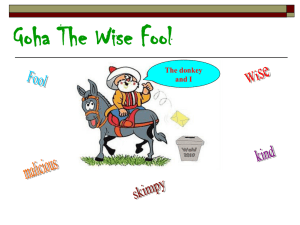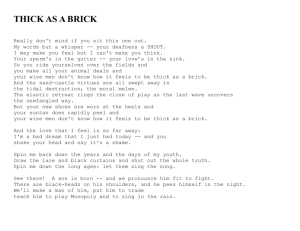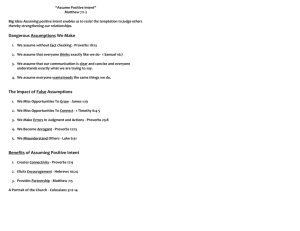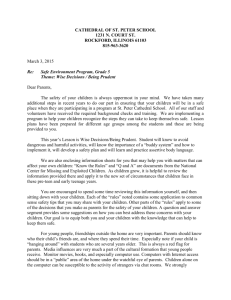Proverbs 29.1
advertisement
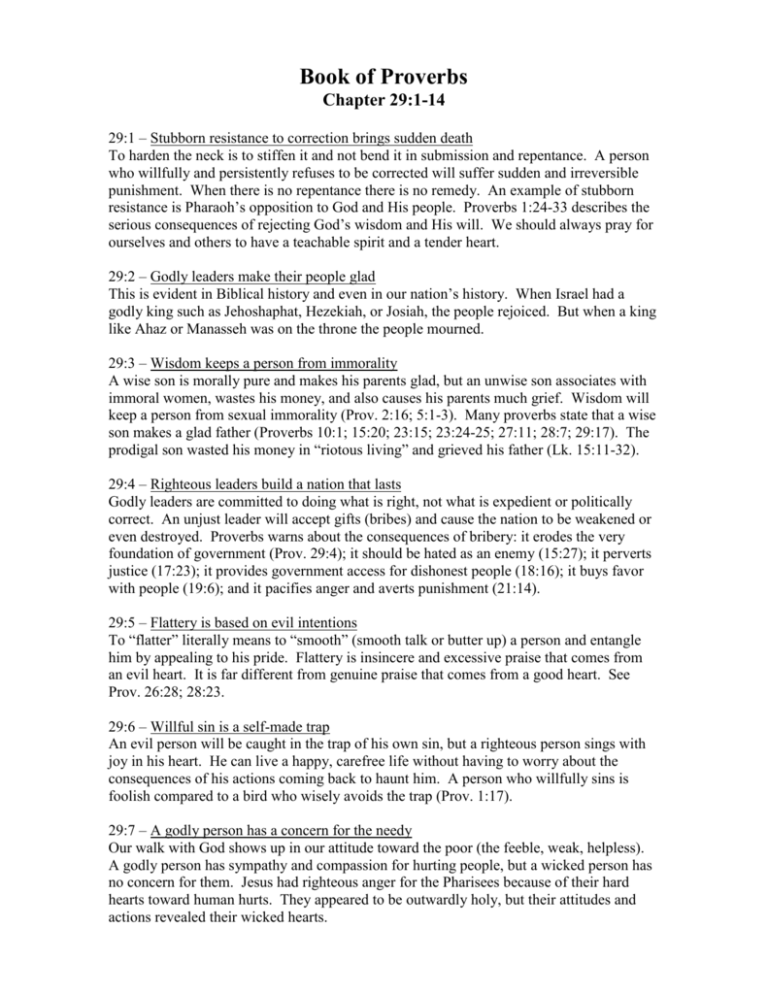
Book of Proverbs Chapter 29:1-14 29:1 – Stubborn resistance to correction brings sudden death To harden the neck is to stiffen it and not bend it in submission and repentance. A person who willfully and persistently refuses to be corrected will suffer sudden and irreversible punishment. When there is no repentance there is no remedy. An example of stubborn resistance is Pharaoh’s opposition to God and His people. Proverbs 1:24-33 describes the serious consequences of rejecting God’s wisdom and His will. We should always pray for ourselves and others to have a teachable spirit and a tender heart. 29:2 – Godly leaders make their people glad This is evident in Biblical history and even in our nation’s history. When Israel had a godly king such as Jehoshaphat, Hezekiah, or Josiah, the people rejoiced. But when a king like Ahaz or Manasseh was on the throne the people mourned. 29:3 – Wisdom keeps a person from immorality A wise son is morally pure and makes his parents glad, but an unwise son associates with immoral women, wastes his money, and also causes his parents much grief. Wisdom will keep a person from sexual immorality (Prov. 2:16; 5:1-3). Many proverbs state that a wise son makes a glad father (Proverbs 10:1; 15:20; 23:15; 23:24-25; 27:11; 28:7; 29:17). The prodigal son wasted his money in “riotous living” and grieved his father (Lk. 15:11-32). 29:4 – Righteous leaders build a nation that lasts Godly leaders are committed to doing what is right, not what is expedient or politically correct. An unjust leader will accept gifts (bribes) and cause the nation to be weakened or even destroyed. Proverbs warns about the consequences of bribery: it erodes the very foundation of government (Prov. 29:4); it should be hated as an enemy (15:27); it perverts justice (17:23); it provides government access for dishonest people (18:16); it buys favor with people (19:6); and it pacifies anger and averts punishment (21:14). 29:5 – Flattery is based on evil intentions To “flatter” literally means to “smooth” (smooth talk or butter up) a person and entangle him by appealing to his pride. Flattery is insincere and excessive praise that comes from an evil heart. It is far different from genuine praise that comes from a good heart. See Prov. 26:28; 28:23. 29:6 – Willful sin is a self-made trap An evil person will be caught in the trap of his own sin, but a righteous person sings with joy in his heart. He can live a happy, carefree life without having to worry about the consequences of his actions coming back to haunt him. A person who willfully sins is foolish compared to a bird who wisely avoids the trap (Prov. 1:17). 29:7 – A godly person has a concern for the needy Our walk with God shows up in our attitude toward the poor (the feeble, weak, helpless). A godly person has sympathy and compassion for hurting people, but a wicked person has no concern for them. Jesus had righteous anger for the Pharisees because of their hard hearts toward human hurts. They appeared to be outwardly holy, but their attitudes and actions revealed their wicked hearts. 29:8 – Arrogant rulers lead their people into trouble Scorners are arrogant, proud mockers. They incite (lit., inflame) trouble by their arrogance and rebellion. On the other hand wise rulers make godly decisions and avert anger. This may refer to God’s judgment, human punishment, or both. 29:9 – Dealing with foolish people is difficult If a wise person contends with (debates, challenges) a fool (arrogant, hardened person), the fool will either vent his anger on him or make fun of him, so there is no rest or resolution to the matter. There is no way for a wise man to “win” with a fool. The wise person must do and say what is right and leave the outcome in God’s hands. 29:10 – The ungodly hate the godly Jesus confirmed this proverb by saying the world hated His disciples (Jn. 17:14). An ungodly person has a natural hatred toward a righteous person, but a righteous person seeks the welfare of his soul. Compare Cain (Gen. 4:8-9) to Joseph (Gen. 50:19-21). We are supposed to be our brother’s keeper, not his killer. 29:11 – A wise person controls his thoughts and words A person who speaks his mind is a fool (thick-headed, stubborn person). A wise person carefully thinks before he speaks. A wise person controls his thoughts, words, and emotions (Prov. 29:11, 20, 22). The expression “keepeth it in” literally reads “calms it back.” This same word is found in Psalm 65:7 and 89:9 where it refers to calming the sea waves. A wise person calms down instead of blowing up. 29:12 – A wicked ruler chooses wicked servants If a ruler listens to lies (possibly flattery), then he surrounds himself with servants who lie (flatter him). This is another proverb that reveals “birds of a feather flock together.” 29:13 – All people have some things in common The poor and the deceitful man meet together (share some common experiences). God enables both of them to see the light of day. The deceitful (rich) man is contrasted to the poor (destitute, hungry) man because riches were sometimes gained through deceit. Some things are true of all people whether rich or poor: 1) 2) 3) 4) 5) God creates the life of all (Prov. 22:2) God sustains the life of all (Prov. 29:13; Mt. 5:45; Acts 17:25) God offers eternal life to all (Jn. 3:16) God requires the life of all (Rom. 6:23; Heb. 9:27) God judges the life of all (Heb. 9:27) 29:14 – A faithful leader brings stability to government Similar to Proverbs 29:4, this proverb describes a king who faithfully administers justice and brings stability to his kingdom. The poor are often mistreated by corrupt leaders because they are helpless and unable to defend themselves. A faithful ruler establishes his kingdom by justice rather than by force, deception, bribes or corruption (see Prov. 16:12; 20:28; 25:5). A blessed nation has faithful statesmen who lead by godly principles instead of crooked politicians who seek their own interests. Pres. Dwight Eisenhower once said: “In order to be a leader a man must have followers. And to have followers, a man must have their confidence. Hence the supreme quality of a leader is unquestionable integrity.” Book of Proverbs Chapter 29:1-14 29:1 – ___________________________________________________________________ To harden the neck is to stiffen it and not bend it in submission and repentance. A person who willfully and persistently refuses to be corrected will suffer sudden and irreversible punishment. When there is no repentance there is no remedy. We should always pray for ourselves and others to have a teachable spirit and a tender heart. 29:2 – ___________________________________________________________________ When Israel had a godly king such as Jehoshaphat, Hezekiah, or Josiah, the people rejoiced. But when a king like Ahaz or Manasseh was on the throne the people mourned. 29:3 – ___________________________________________________________________ A wise son is morally pure and makes his parents glad, but an unwise son associates with immoral women, wastes his money, and also causes his parents much grief. Wisdom will keep a person from sexual immorality (Prov. 2:16; 5:1-3). Many proverbs state that a wise son makes a glad father (Proverbs 10:1; 15:20; 23:15; 23:24-25; 27:11; 28:7; 29:17). 29:4 – ___________________________________________________________________ Godly leaders are committed to doing what is right, not what is expedient or politically correct. An unjust leader will accept gifts (bribes) and cause the nation to be weakened or even destroyed. Proverbs warns about the consequences of bribery: it erodes the very foundation of government (Prov. 29:4); it should be hated as an enemy (15:27); it perverts justice (17:23); it provides government access for dishonest people (18:16); it buys favor with people (19:6); and it pacifies anger and averts punishment (21:14). 29:5 – ___________________________________________________________________ To “flatter” literally means to “smooth” (smooth talk or butter up) a person and entangle him by appealing to his pride. Flattery is insincere and excessive praise that comes from an evil heart. It is far different from genuine praise that comes from a good heart. See Prov. 26:28; 28:23. 29:6 – ___________________________________________________________________ An evil person will be caught in the trap of his own sin, but a righteous person sings with joy in his heart. He can live a happy, carefree life without having to worry about the consequences of his actions coming back to haunt him. A person who willfully sins is foolish compared to a bird who wisely avoids the trap (Prov. 1:17). 29:7 – ___________________________________________________________________ Our walk with God shows up in our attitude toward the poor (the feeble, weak, helpless). A godly person has sympathy and compassion for hurting people, but a wicked person has no concern for them. Jesus had righteous anger for the Pharisees because of their hard hearts toward human hurts. 29:8 – ___________________________________________________________________ Scorners are arrogant, proud mockers. They incite (lit., inflame) trouble by their arrogance and rebellion. On the other hand wise rulers make godly decisions and avert anger. This may refer to God’s judgment, human punishment, or both. 29:9 – ___________________________________________________________________ If a wise person contends with (debates, challenges) a fool (arrogant, hardened person), the fool will either vent his anger on him or make fun of him, so there is no rest or resolution to the matter. There is no way for a wise man to “win” with a fool. The wise person must do and say what is right and leave the outcome in God’s hands. 29:10 – __________________________________________________________________ Jesus confirmed this proverb by saying the world hated His disciples (Jn. 17:14). An ungodly person has a natural hatred toward a righteous person, but a righteous person seeks the welfare of his soul. Compare Cain (Gen. 4:8-9) to Joseph (Gen. 50:19-21). We are supposed to be our brother’s keeper, not his killer. 29:11 – __________________________________________________________________ A person who speaks his mind is a fool (thick-headed, stubborn person). A wise person carefully thinks before he speaks. A wise person controls his thoughts, words, and emotions (Prov. 29:11, 20, 22). The expression “keepeth it in” literally reads “calms it back.” A wise person calms down instead of blowing up. 29:12 – __________________________________________________________________ If a ruler listens to lies (possibly flattery), then he surrounds himself with servants who lie (flatter him). This is another proverb that reveals “birds of a feather flock together.” 29:13 – __________________________________________________________________ The poor and the deceitful man meet together (share some common experiences). God enables both of them to see the light of day. The deceitful (rich) man is contrasted to the poor (destitute, hungry) man because riches were sometimes gained through deceit. Some things are true of all people whether rich or poor: 1) God_____________________________________________________ (Prov. 22:2) 2) God____________________________________________ (Mt. 5:45; Acts 17:25) 3) God_______________________________________________________ (Jn. 3:16) 4) God____________________________________________ (Rom. 6:23; Heb. 9:27) 5) God______________________________________________________ (Heb. 9:27) 29:14 – __________________________________________________________________ Similar to Proverbs 29:4, this proverb describes a king who faithfully administers justice and brings stability to his kingdom. The poor are often mistreated by corrupt leaders because they are helpless and unable to defend themselves. A faithful ruler establishes his kingdom by justice rather than by force, deception, bribes or corruption (see Prov. 16:12; 20:28; 25:5). A blessed nation has faithful statesmen who lead by godly principles instead of crooked politicians who seek their own interests. Pres. Dwight Eisenhower once said: “In order to be a leader a man must have followers. And to have followers, a man must have their confidence. Hence the supreme quality of a leader is unquestionable integrity.”

